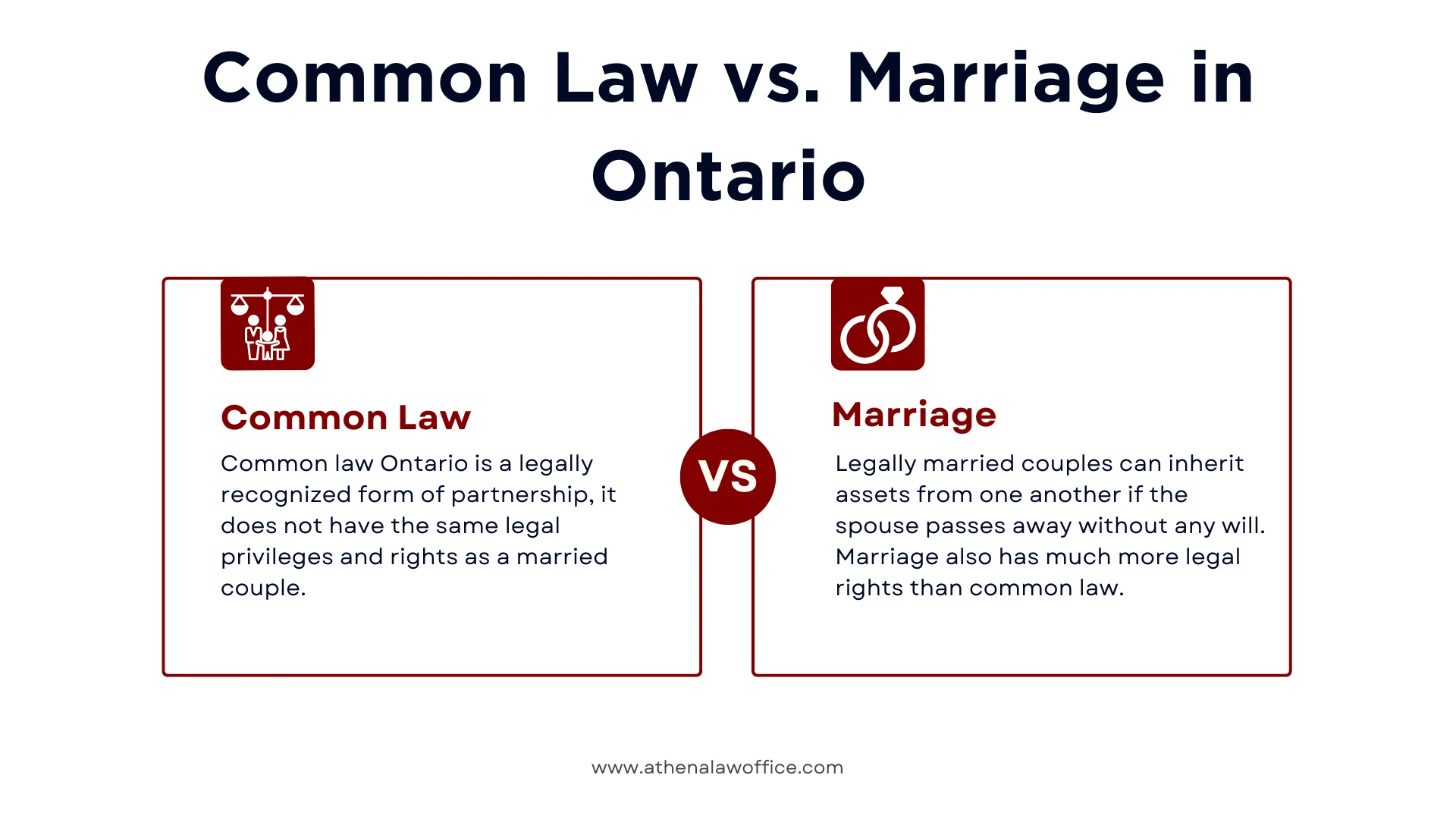As the world evolves, marriage is not the only type of formal relationship people opt for. Instead, there are various options for couples who don’t want to get married.
One of them is to opt for a common law relationship. If you and your partner are deciding to go down this route, then here is a comprehensive guide to help you understand common law Ontario.
What is Common Law Ontario?

Common Law Ontario refers to a conjugal relationship in which two people live together in Canada without being legally married.
There are only certain situations where Canadian Law will recognize a common law relationship. What is considered a common law relationship will depend on the context of the situation.
For example, what is considered common law Ontario will differ in the context of estate planning, immigration, taxes, and much more.
When Are You Considered Common Law in Ontario?
Two people are considered common law Ontario when they have been continuously living together in a conjugal relationship for a minimum of three years.
On the other hand, if the couple has a child together, either through adoption or birth, they will only need to live together for a minimum of one year to be considered common law in Ontario.
What is a Conjugal Relationship?
A conjugal relationship is mostly confused with having a sexual relationship, but it is more than that. In Canada, a conjugal relationship is where two people share finances, property, social life, and an emotional connection along with a sexual relationship.
So, to fulfill the common law Ontario criteria, the couple must be in a conjugal relationship.
Common Law vs. Marriage in Ontario

While common law Ontario is a legally recognized form of partnership, it does not have the same legal privileges and rights as a married couple.
For example, legally married couples can inherit assets from one another if the spouse passes away without any will. On the other hand, there is no legal outline for ending a common law relationship; you can learn more about how to end a common law relationship here.
There are also differences in dividing assets and property. To help you understand this subject matter, let’s discuss it in detail in Ontario common law rules.
Ontario Common Law Rules

Common law in Ontario has various implications for people’s lives. To understand these implications, one must examine the Ontario common law rules.
Our family lawyer in Ontario will discuss each of these rules in detail to help provide you with a complete picture of common law Ontario:
1. Common Law Ontario Property Division: Can Common Law Take Half in Ontario?
No, your common law partner can’t take half in Ontario. If you are in such a relationship in Ontario, the property that you bring into the relationship will continue to belong only to you.
Unlike marriage, you do not automatically have the right to divide your property or share it with your common law partner through the equalization of net family property. You can only split the property if it was owned jointly by you and your partner.
On the other hand, if you contributed to the property of your common law partner during the relationship, then you might have some right to a part of it through a constructive trust resulting from an unjust enrichment.
Such a trust allows the common law partners to have a share in the value of the property, even if they don’t have the legal title. However, it will only be the case if the courts decide that the partner was unjustly enriched at the other’s expense.
Seeking a Constructive Trust Order
A constructive trust will allow one of the spouses who is not on the title to gain a right to property in a particular asset, such as a home.
For example, a cohabitating spouse that has stayed home with the children and been in service of domestic tasks can be awarded a monetary compensation or a constructive trust over the matrimonial home where the contribution is connected to the property itself.
If you want to seek a constructive trust order, you will have to establish these important requirements:
- One spouse is being enriched, which will result in a deprivation of the contributing spouse
- The contribution of labor or money by the spouse will enrich the legal titleholder of the property
- There is a connection between the improvement or acquisition of the property and the contribution made by one of the cohabiting spouse
- There is no juristic reason for the enrichment of the property
Please note that the third requirement is the most important one. Without this, the courts will only provide you with monetary compensation and not a share of the property.
Other than that, the courts will only award property in proportion to the contribution you have made.
2. Common Law Matrimonial Home Possession Rules
Part II of the Family Law Act deals with possession of the matrimonial home and only applies to married couples. Common law Ontario spouses don’t have access to the same rights.
However, you have different options as a common law couple, which include the following:
- If you have been living together for a minimum of three years and are in a relationship of some permanence along with having a child either through birth or adoption, you can apply for possession of the matrimonial home as part of your spousal support. You can do this under Section 29 of the Family Law Act.
- Cohabitating spouses can get constructive trust in the matrimonial home. The order may lead to giving each spouse a joint equitable interest in the home and joint possessory rights (equal right to live in the home).
- The court may decide to make a final or interim restraining order against the applicant’s former or current spouse or a person who has or is cohabitating with the applicant for any period of time. Please note that the restraining order will be made if the applicant has reasonable grounds to fear their safety or their child’s.
- If the cohabitant has criminal charges, then the bail conditions can exclude them from the matrimonial home.
So, as a common law Ontario couple, you have the following remedies for possession of the matrimonial home. To discuss your options, you can contact our family lawyer in Ontario.
3. Common Law Ontario Asset Division Rules
Not all relationships last forever. You might have to go through common law separation and determine the division of assets during that time.
Typically, the property owned by the titleholder is distributed based on that. Common law Ontario doesn’t follow equalization of net family property.
However, you have two options when it comes to asset division under a common law relationship in Ontario:
- You can ask your common law partner to pay you back for any non-financial or financial contribution you have made towards the property
- You can also go to court and make claims or resulting trust, unjust enrichment, or constructive trust
We have already discussed constructive trust and unjust enrichment, but here is what you need to know about the resulting trust.
Resulting Trust
A resulting trust is when one of the spouses pays or helps pay for a piece of property. However, the legal title is with the other spouse.
When one person helps pay for the property, they become the beneficial interest holder, and there is a presumption that the legal title holder is the trustee of the beneficial interest holder.
So, when common law separation takes place, the interest that is equal to the contribution will be given back to the beneficial interest holder.
Please note that the Supreme Court of Canada in 1980 stated that the resulting trust will only be applicable when the court is satisfied that both parties intended that the beneficial interest would not only belong to the title holder but is to be shared between them.
An example of both parties’ intentions could be when the money for purchasing the property is taken from a joint bank account to which both spouses have added their funds.
4. Common Law Ontario Spousal Support Rules
Common law spouses may be entitled to spousal support after separation. For example, if you had assets or earned more income than your partner, you might need to pay spousal support to facilitate your common law spouse’s financial independence.
Remember that spousal support is not an automatic right in common law Ontario. If you don’t have a cohabitation agreement or separation agreement in place defining the spousal support obligations, then you can either go to court or negotiate the payments through a separation agreement.
Your common law separation lawyer in Ontario will guide you on how you can make this happen.
5. Common Law Ontario Pension Rules
Under the CPP (Canada Pension Plan), the surviving spouse is entitled to the pension of the deceased regardless of whether the person was married or in a common law partnership.
Our guide explains more about CPP credit splitting and helps clarify this topic.
Benefits of Common Law Ontario

Most people opt for common law Ontario because they don’t meet legal marriage requirements. In that case, couples decide to move in together.
If you choose the same, here are some benefits of the option for a common law relationship in Ontario:
- Couples have more autonomy, maintain a separate legal status, and can independently manage their personal decisions and finances.
- The living spouse will be entitled to the pensions of the other spouse in case of their passing.
- You don’t have to go through an extensive process to dissolve your common law relationship.
- Common law partners don’t need to file joint tax returns.
These are the top benefits you will reap if you opt for common law Ontario as your relationship.
Common Law in Other Provinces: A Glimpse into Common Law Ontario vs. Canada
| Province | What is Considered a Common Law Relationship? |
| Ontario | When two people live together for three continuous years or minimum one year if they have a child through adoption or birth. |
| British Columbia | Living together as a marriage-like couple for two continuous years, or living together for less than two years but having a child together. |
| Alberta | In Alberta, it is known as an Adult-Dependent Relationship. For this, you need to have a formal agreement, live together for at least three years, or be in a relationship of some permanence with a child by birth or adoption. |
| New Brunswick | Living together for three continuous years or having a child together with a relationship of some permanence. |
| Manitoba | When the couple has registered their relationship at the Vital Statistics Agency. If the couple has not registered, then the requirement is to live together for at least three years, or one year, in case of having a child together. |
| Saskatchewan | Living together continuously for a minimum of two years. |
| Nova Scotia | Living together in a marriage-like relationship or referring as partner or spouse publicly. The length couple must live together depends on the issue. |
| Quebec | Known as a de facto union. Quebec will consider you common law for tax purposes once you have continuously lived together for two years minimum. If you are not married in Quebec, your spouse will get nothing even if you pass away. |
FAQs
Do you automatically become common law in Canada?
You automatically become common law in Canada if you have been living continuously in a conjugal relationship together for a minimum of three years. If you have a child by adoption or birth, then this period reduces to a minimum of one year of living together to be considered common law.
What happens if you break up with your common law partner?
Common law couples don’t need a court to make their dissolution official. Instead, you can settle your issues without even going to court, but we recommend having a family lawyer in Ontario to help you.
What qualifies as common law in Canada?
What will qualify as common law in Canada will depend on the province you are living. Typically, the couple must be living together for a minimum number of years or have a child together through adoption or birth to be considered as common law in most provinces.
Can a common law spouse get alimony in Ontario?
In Ontario, common law spouses will have the same rights as married couples in terms of spousal support. However, they must be living together for a minimum of three years to qualify for this.
Schedule a Consultation with Our Family Lawyer to Understand Common Law Ontario
For more information regarding common law Ontario, please feel free to get in touch with us. You can schedule a consultation with our family lawyer in Ontario to discuss any details.
We will be more than happy to help you with your case in any way you require us to do so.
Author Profile

- Barnett Law is a trusted and knowledgeable lawyer in Scarborough. Her expertise spans real estate law, family law, adoptions and fertility law. A lawyer by profession and a humanitarian by heart, Athena Narsingh Barnett wants to help people become more familiar with the legal system and be well-informed to make important legal decisions.
Latest entries
 Family LawOctober 27, 2025How Much Does A Divorce Cost In Ontario In 2025?
Family LawOctober 27, 2025How Much Does A Divorce Cost In Ontario In 2025? Family LawOctober 22, 2025Divorce Rate In Canada 2025: Top Divorce Statistics To Know
Family LawOctober 22, 2025Divorce Rate In Canada 2025: Top Divorce Statistics To Know legal guidanceOctober 17, 2025How Much Does Adoption Cost In Canada?
legal guidanceOctober 17, 2025How Much Does Adoption Cost In Canada? legal guidanceJuly 4, 2025What Disqualifies You From Adopting A Child In Canada?
legal guidanceJuly 4, 2025What Disqualifies You From Adopting A Child In Canada?


